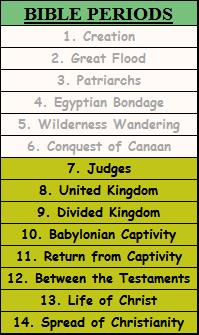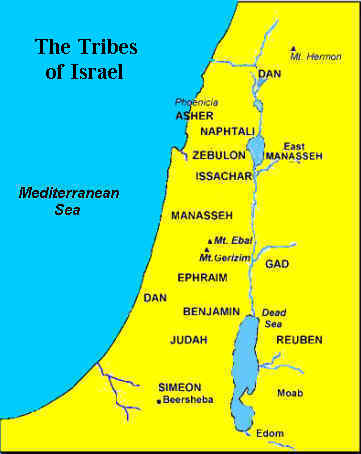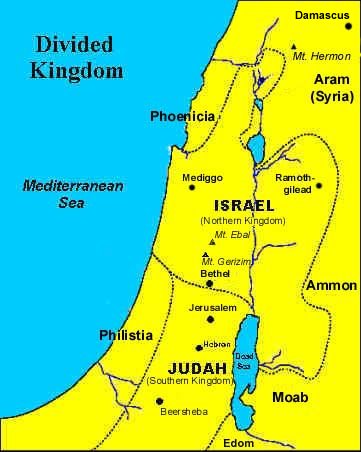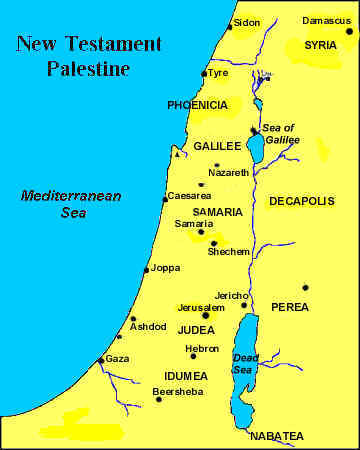
Lesson 3
A SURVEY OF BIBLE HISTORY (Part 2)
King James Version (KJV)
In this lesson you will continue the study begun in Lesson 2 by surveying the remaining eight periods of Bible history.
7. The Judges of Israel
After Joshua died the Israelites fell under the influence of the idolatrous religion of the Canaanites. They fell away from God and did not faithfully practice the Law of Moses. To punish them, God allowed nearby nations to invade Israel and make their life miserable.

The foreign conquerors kept the Israelites in subjection until conditions became intolerable. Only then did the Israelites repent and return to God. When their attitude changed, God appointed an Israelite to come to the forefront and lead the Israelites in a campaign to throw off the foreign yoke. This leader, called a "judge," usually influenced Israel to serve God faithfully for a number of years. When he (or she, in one case) died, the Israelites foolishly forgot the lessons of the past and returned to the idol worship of their heathen neighbors. The cycle of apostasy, oppression, deliverance, and peace involved 15 judges over a period of about 300 years.
8. The United Kingdom

The period of the judges ended when the Israelites became dissatisfied with that form of government. The leaders of the Israelites approached Samuel, the last judge, and insisted on having a king. Samuel anointed Saul, a man from the tribe of Benjamin, to be the first king. He ruled for 40 years. He began well by winning several important battles for Israel. Eventually he began to ignore the commands of God. God responded by promising to give the throne to a different tribe and family.
David, a man from the tribe of Judah, was Israel's second king. At first he reigned only over the tribe of Judah. He became king over all of Israel when the kingdom ruled by Saul's son collapsed. In all David reigned 40 years. His great contribution to the rulership of Israel was military. While he was king, the nation expanded to the border of Egypt on the south and to the Euphrates River on the north.
Solomon followed his father David to the throne. He was not a warrior but a builder and an administrator. His most famous structure was the temple of God in Jerusalem. Under Solomon, Israel reached its golden age of peace and prosperity. Solomon also reigned for 40 years.
9. The Divided Kingdom

The United Kingdom ended shortly after Solomon died. Under his son, Rehoboam, ten of the twelve tribes rebelled and set up their own kingdom. Only the tribes of Judah and Benjamin remained loyal to Rehoboam. Thereafter, the kingdom of the ten tribes was known as Israel. The kingdom of Rehoboam and his successors was known as Judah. The word "Jew" derives from the name of this kingdom.
From a religious and moral standpoint, and ultimately from a political and military standpoint, the period of the Divided Kingdom was a failure. The people of both nations lapsed into idolatry and eventually became too spiritually hardened to listen to the prophets God sent to warn them of their impending doom.
God brought in foreign nations to subdue His people. The army of the Assyrian empire invaded Israel and captured Samaria, the capital city, in 721 BC. Most of the Israelites were deported to Assyria.
After the decline of Assyrian domination, Babylon became the next world power. The Babylonians launched a series of invasions of Judah that began in 605 BC and ended with the destruction of Jerusalem, the capital of Judah, in 586 BC.
10. Babylonian Captivity
If we start at the time the first group of Jews was deported (605 BC.) and count forward almost 70 years, we see that the political situation in the Near East had become radically different. The power of the Babylonian Empire proved to be short-lived. The Medes and Persians joined forces under Cyrus the Mede and in 539 BC overthrew Babylon, which by this time had become hopelessly corrupt.
11. Return from Captivity
In the same year, Cyrus allowed the deported Jews to go back to Judah. A group of about 50,000 decided to return. Over a period of years they rebuilt the temple the Babylonians had destroyed (Ezra 1-6).
About 80 years later, a priest named Ezra brought another group of Jews to Jerusalem. His goal was to restore the worship of God to its former purity by teaching the Law of Moses to the Jews (Ezra 7-10).
At almost the same time, a Jew named Nehemiah who occupied an important position in the Medo-Persian kingdom received permission to go to Jerusalem and rebuild its walls. Nehemiah was a capable leader, and the walls were quickly constructed in spite of opposition from local non-Jewish residents. Nehemiah found, just as Ezra had done, that the moral condition of the Jews was in a state of decline. Through his and Ezra's efforts the spiritual level of the Jews seemed to be briefly elevated. However, a spiritual indifference set in that led God to stop communicating to the Jews through prophets for over 400 years.
12. Between the Testaments
As the name implies, no books of the Bible were written during this period. However, significant events did transpire. Eventually the Medo-Persian Empire, dominant when the Old Testament record ended, fell to the Greeks under Alexander the Great. Alexander died at an early age, and the empire he had built, which reached from Greece to the Indus River of India, was divided among his generals. The two parts of main interest to Bible students are Syria and Egypt
Unfortunately for the Jews, their land lay directly between the two kingdoms. As the two kings vied for power with each other, the territory of the Jews was tugged back and forth. At one point when the Syrians were in control, the king made life so intolerable for pious Jews that they decided to fight back. With Judas Maccabeus and his brothers taking the lead, the Jews were able to win their independence in 163 BC.
Meanwhile, in the west the Romans were gaining power. They began an eastward conquest that eventually encompassed the remnants of the former Greek Empire. In the process they absorbed Judah in 63 BC. They appointed a man named Herod, later known as "Herod the Great," to be the king of the Jews.
13. The Life of Christ
Herod was king when Jesus was born in Bethlehem, a town just south of Jerusalem. It was in this manner that the Son of God assumed human form. While Jesus was still a baby, His parents took Him to Egypt for a brief period. When the family returned, they went to live in Nazareth, 65 miles north of Jerusalem.

Jesus began His ministry when He was about 30 years old. During that period He selected twelve apostles, men with whom he was to be most closely associated, and taught them about His coming kingdom. Jesus also preached to the Jews and worked miracles to heal their sick, lame, and blind. Because Jesus claimed He was both the Christ (the Messiah the Jews had long hoped for) and the Son of God and because He was immensely popular among the common people, the jealous leaders of the Jews looked for opportunities to put Him to death. After three years, they succeeded. They captured Him one evening in a garden a few hundred yards east of Jerusalem where He had gone to pray. The next morning they were able to pressure the weak-willed Pontius Pilate, the Roman governor, to consent to His death. Roman soldiers took Jesus outside the city and crucified Him. Little did the Jewish leaders realize they had played directly into God's hands. According to God's plan for redeeming the world, it was essential that Jesus give His life as a sacrifice for sin.
Three days later, God sent angels to open the tomb where Jesus was buried. Restored to life by the power of God, Jesus met with His disciples on several occasions during the next 40 days. Then from the Mount of Olives, the mountain ridge just to the east of Jerusalem, Jesus, the Son of God, ascended to heaven, returning to the spiritual realm from which he had come 33 years earlier. Moments before He departed, He told His apostles to remain in Jerusalem and wait for the coming of His kingdom.
14. The Spread of Christianity
About a week later the apostles were together in a room in Jerusalem. It was the day of Pentecost, the first day of one of the annual Jewish festivals. Jews from all over the Roman Empire had come to Jerusalem to celebrate. This was the day God chose to establish the church Jesus had promised His apostles (Matt. 16:18). God filled the apostles with the Holy Spirit. They began preaching about Christ's death, burial, and resurrection. Many Jews in Jerusalem learned what to do to have God forgive their sins. About 3000 people who believed what the apostles preached were baptized that day. God added them to His church, the body of those who have been saved.
The church in Jerusalem grew rapidly even though the Jewish leaders opposed it. They tried to end the new movement by first threatening and then persecuting the Christians. Their efforts actually caused Christianity to spread because those who were persecuted fled from the city and preached the gospel (the good news of salvation) wherever they went. After the gospel had been preached to the Jews for several years, God also wanted the gospel to be preached to the Gentiles. Paul was an apostle who specialized in teaching Gentiles. He preached in both western Asia and southern Europe and established local churches wherever he went. Before Paul died, the Romans had begun to persecute followers of Christ. The last book of the New Testament, called "The Revelation of John", was written while the apostle John was on an island in Mediterranean Sea where he had been exiled by the Romans.
This completes the gist of the historical period covered by the Bible. In this and the previous lesson we have recounted what happened without explaining why it happened. Later, we will investigate the reasons.
If you have difficulties in exercising this lesson procedure, please send an E-mail message describing the difficulty to:
webmaster@jordanpark.org
Be sure to specify the following:
1. Lesson number,
2. Bible version,
3. Your browser name and version,
4. Your operating system.
5. Any error message(s)
Visit the Jordan Park Homepage
© 2020, 1998 JORDAN PARK CHURCH OF CHRIST
HUNTSVILLE, ALABAMA